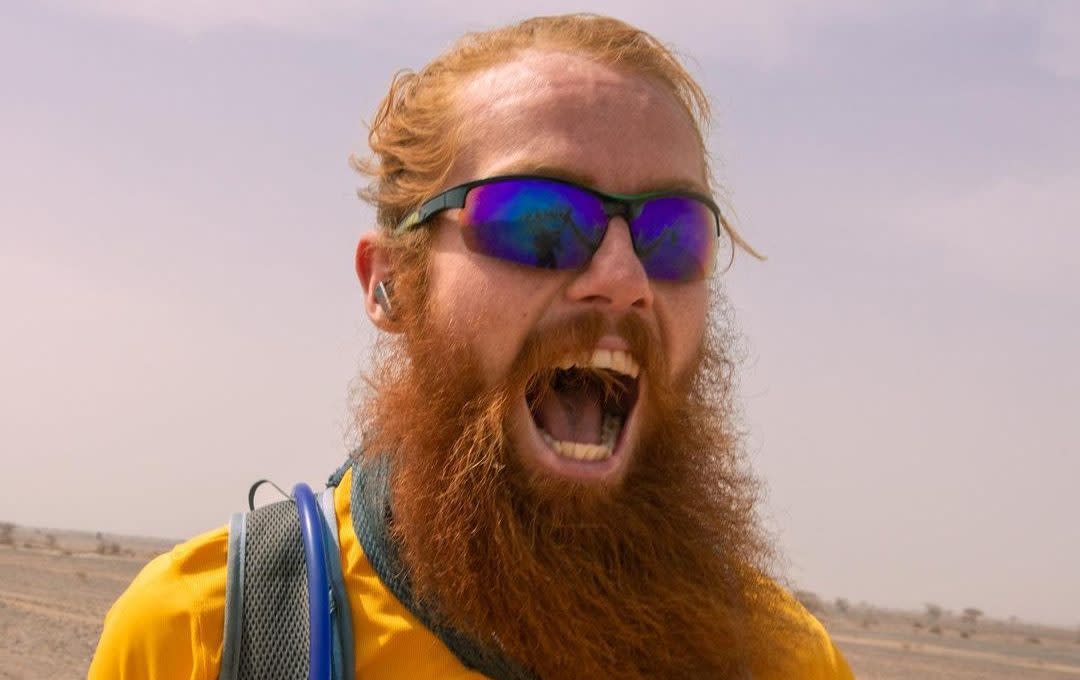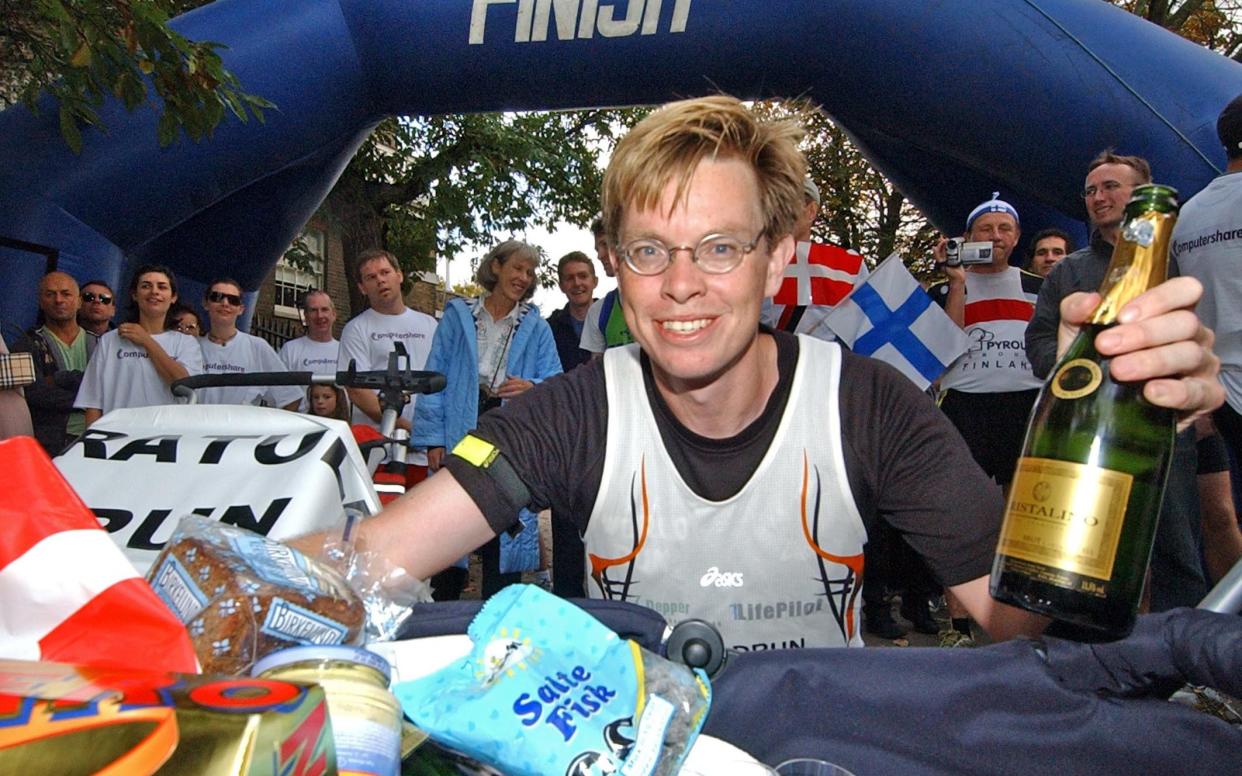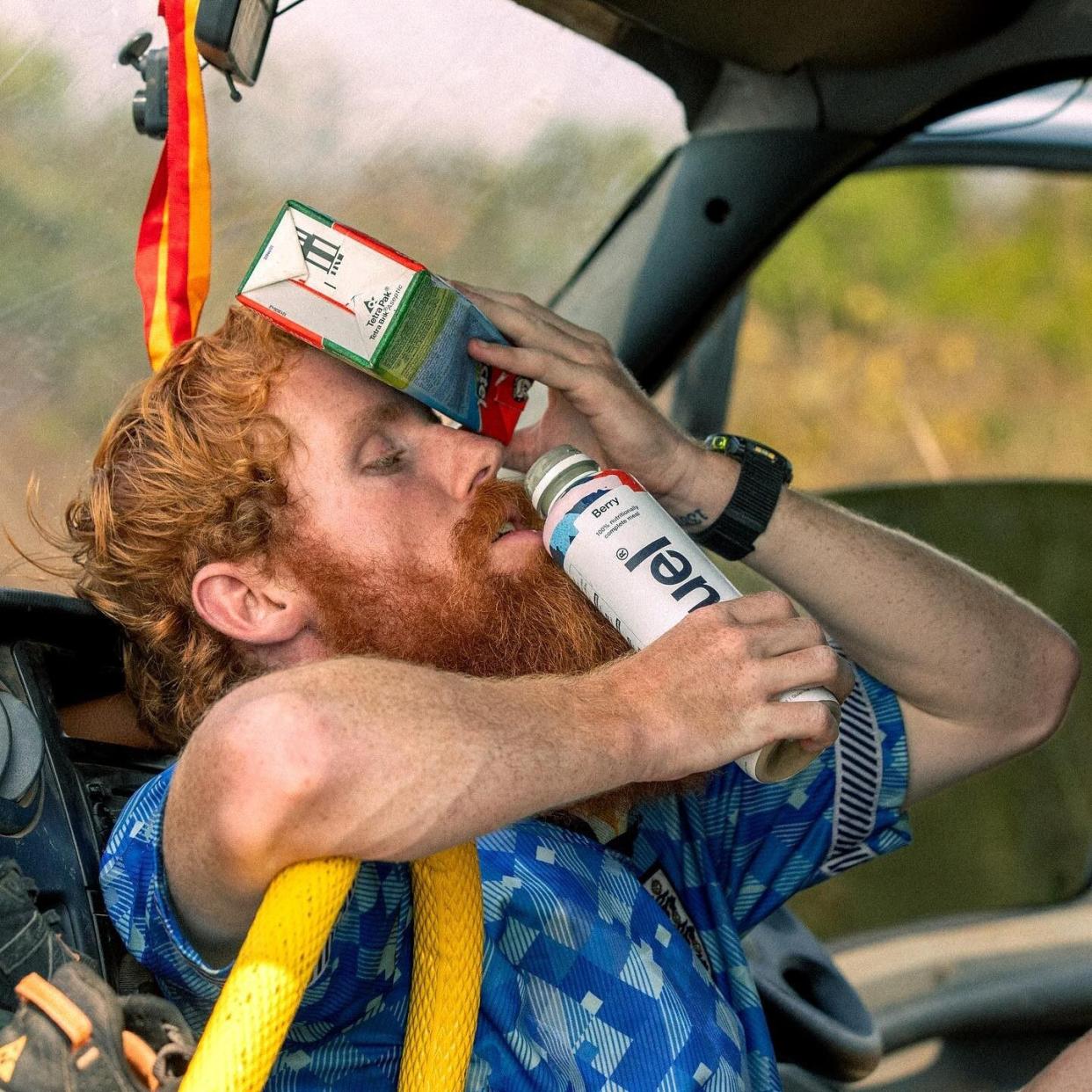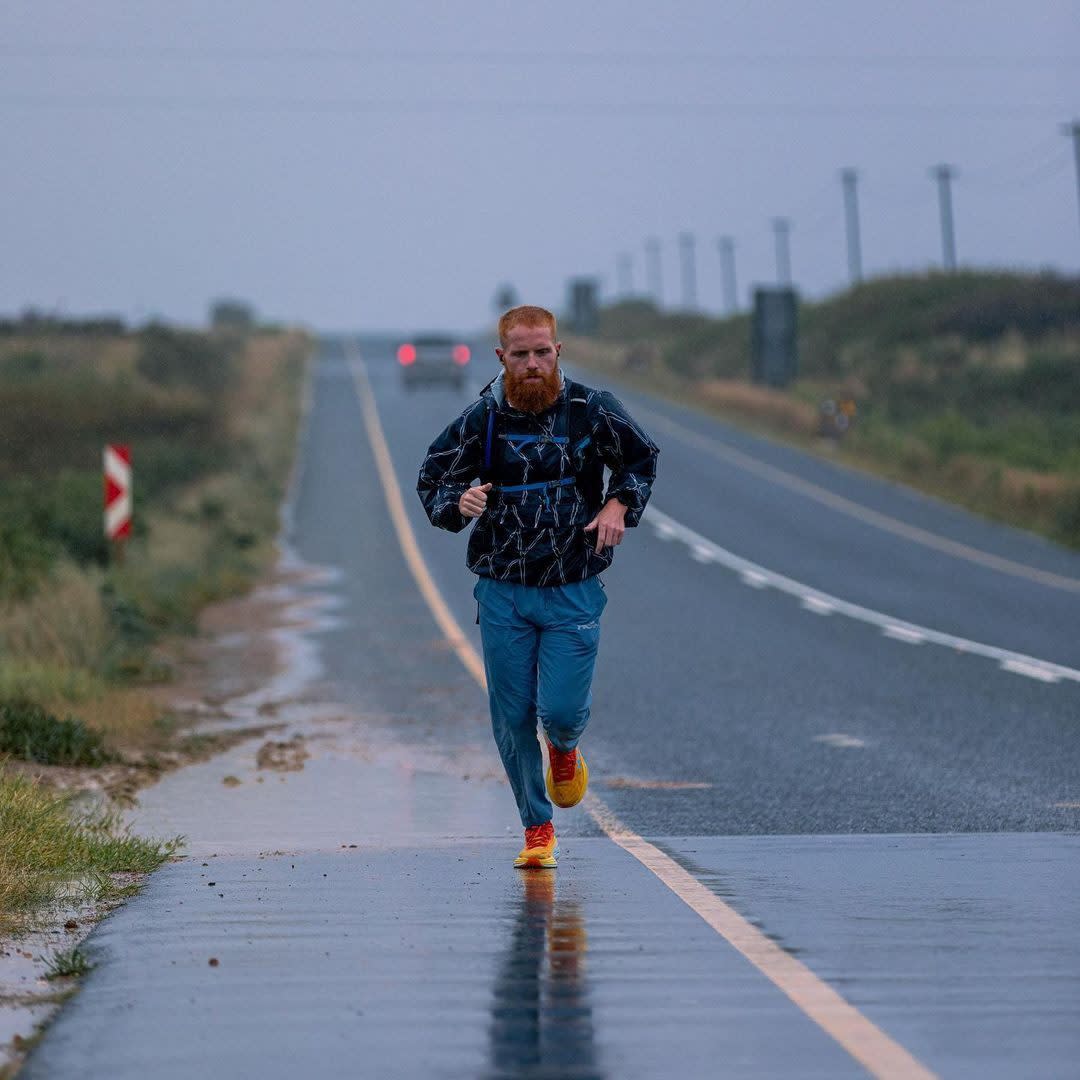How the ‘Hardest Geezer’ ran across Africa straight into an unlikely feud

At first glance, they appeared to be the most unlikely of adversaries. One is a quiet, bespectacled 52-year-old from Denmark immersed in the niche world of ultramarathons.
The other, a tattooed 27-year-old from West Sussex nicknamed the “Hardest Geezer”, who only took to running after a Damascene conversion in a Brighton nightclub less than a decade ago but now boasts a million followers on Instagram.
But on Sunday afternoon, when Russ Cook sashayed over the rocky headland of Ras Angela, Tunisia, he unwittingly also ran head first into a bitter row about the merits of his claim to be the first man to run the length of Africa.
Cook, a 27-year-old from Worthing, West Sussex, had just covered 9,940 miles, or 16,000km, journeying from the continent’s southernmost tip, Cape Agulhas in South Africa, to reach its northernmost point, 352 enervating days later.
As he hurled his familiar white bucket hat in the air and broke the scarlet-red finishing tape held up before him, all he knew was that he’d done it, and now he wanted a strawberry daiquiri, please.
Cook calls himself “the Hardest Geezer” – in part because of undertaking challenges like this, but also because it’s a more memorable brand name than Russell Cook – and had entirely lived up to that moniker. “I’m pretty tired,” he said, with remarkable cheer, before posing on a white throne and drinking deeply from a vast goblet of, yes, strawberry daiquiri.
Victory must have tasted as sweet as the drink. And it was, by any possible metric, an astonishing achievement: aside from the physical feat of running the equivalent distance of Manchester to Liverpool every day for almost a year, often on dirt roads in temperatures exceeding 30 degrees, Cook had faced armed robbery, kidnap, sandstorms, various health scares and innumerable visa issues.
He had set out to become the first person in history to run the length of Africa, from absolute bottom to extreme top. Not only did he manage that, he raised (at the time of writing) more than £800,000 of his £1 million target for two charities in the process.
But the red-haired Englishman with a vast social media following and an unorthodox attitude had, it seemed, upset the purists. Not least Jesper Kenn Olsen, 52, who claimed Cook isn’t the first person to run the length of Africa at all. He is.

“There has recently on social media come a claim of a ‘first run through Africa’ and though it’s certainly a strong ultrarunning effort – it is good practice to remember that there has already been three persons who has run across Africa – and documented it,” Olsen wrote on Facebook on Sunday evening, having been backed by various other ultra distance runners.
The three athletes he was referring to are Serge Girard, from France, the Irishman Tony Mangan and Olsen himself. All three are members of the seven-person World Runners Association, and did it as part of runs around the entire world. And Olsen’s route, in 2008 and 2009, was north-to-south. He and his supporters had pointed this out in comments on Cook’s YouTube videos, only to allegedly have them removed.
“Usually there’s a high level of sportsmanship, so I was surprised to see that for example comments [were] removed when pointing to the facts. It’s a bit as if a half-marathon runner pretends that no one has run a marathon.” (This last comparison is puzzling, given Cook has never denied anybody has run further than 16,000km.)
The sticking point is one of semantics, but ever since Cook announced his challenge, in October 2022, he has been careful to use terms like “entire length” and “full length” when describing his target. Olsen did indeed run the length of Africa, but from Taba, on the Egyptian border with Israel, to the Cape of Good Hope in South Africa.
The former is some 4,000km south of Ras Angela; the latter is 55km north of Cape Agulhas. So while Olsen’s defenders may be accurate when they scoff that Cook’s distance was a mere “segment” of Olsen’s eventual 37,000km world run from Norway to South Africa, then South America to Newfoundland, Cook’s supporters are also accurate when they point out that their man ran the “entire length” of the world’s largest continent.
“What is the difference between 12,500 and 16,500? Asking for a friend,” one wrote under Olsen’s Facebook post. Another simply put: “What was Tunisia like?” Trollish as their responses were, they had a point. Nobody could say they’ve driven the length of mainland Britain if they set off for John O’Groats from Bournemouth. It’s the south coast, but not the southernmost point.
Cook, for his part, acknowledged the row without necessarily getting involved. “There’s plenty of people before me who have done big runs and kudos to all of them because they are all huge challenges, so nothing but respect,” he said. Olsen wrote that “luckily this approach is very rare in ultrarunning where sportsmanship is an important part of our little sport”.
In some ways, despite never having met and never having raced, Cook and Olsen follow a rich tradition of sporting rivalries, in the tracks of James Hunt and Niki Lauda, or Andre Agassi and Pete Sampras. It is the character vs the machine. The maverick vs master. The self-promoter vs the self-effacing.
Olsen began running in Denmark, aged 12, with his father. “In winter we would be able to run across frozen lakes leaving our trail in the fresh untouched snow of early morning,” he wrote in his book, The Runners Guide to the Planet. He loved slowly getting better. “Running is possibly the only sport that requires the most patience; the most investment from the athlete. No victory, no step forward or improvement comes easily. Each step has to be earned in distance training.”
He discovered he was very good at it, so joined a club, then found he could run further than men three times his age. At 15, he ran his first marathon, setting off from the castle of Elsinore, famous as the setting of Hamlet. He ran it in three hours and 26 minutes. “During the next decade I achieved 31 minutes for the 10K, 1.08 hours for the half marathon, and 2.27 hours for the full marathon. Respectable times, yes, but not remarkable in the running universe.”
Olsen has a master’s degree in political science and has said he enjoys “everything from nuclear physics and French philosophy to computer games and long walks along the beach”. As he grew up, he began to question why marathons have to be the limit of running, so pushed things further, and further, and further.
Cook, by contrast, was a non-athlete at the same age Olsen was running marathons, and a self-confessed “fat lad with booze and gambling issues”. His childhood was troubled, his youth unmarked by achievement, so one night in his early 20s, feeling a “mess of a bloke”, he decided to do something about it.

“I was in a nightclub in Brighton and I had this mad realisation: What am I doing with my life? Something needs to change. I decided I was going to run home. I had to have a couple of power naps on the pavement on the way, but I made it.”
He then ran a half marathon, before realising running was offering him the discipline and challenges he needed to focus. “I’m hesitant to say that running or exercise is the solution to everyone’s problems because it’s not, it’s more complicated than that. But running or fitness and exercise can be the spark.”
He is, he insists, “not anything special” physically. “If you put me in a lab, I’m not genetically anything unusual.” Olsen’s personal bests, on the other hand, suggest his body is entirely suited to running – and quickly. But Cook certainly has a preternatural knack for getting attention.

In 2019, he ran from Turkey to London, completing 71 marathons in 66 days, then halved the world record for the fastest car-pulling marathon when he dragged a 730kg Suzuki Alto 26 miles along the Worthing seafront. Three years ago he was buried alive for a week for a challenge streamed online. “No one gets to decide your limitations except you,” is his mantra. He is yet to find his.
Acknowledging a gift for catching the eye of onlookers is not to say Cook shirked the training that an ultra distance run demands. He may have made jokes and talked about the best party towns in Senegal, but he wasn’t Usain Bolt eating chicken nuggets before a race, either.
Olsen, a clean-cut, clean-living Scandinavian whose running CV is littered with records, trained for his (two) world runs with daily training sessions of 25 to 45km, and “more important was my 25 years of marathon and ultramarathon running”. Cook also ran 25 to 40km a day for a year, even running up and down the corridors of airport terminals on days he had long-haul flights. Towards the end of his training block before Africa, he ran 100km from first thing in the morning to last thing at night. During the challenge, too, they both aimed to cover the same distance – 40 to 50km – every day.
The key difference, then, is the fact Cook’s picture appeared on every newspaper and website in the country this week, and all over social media for the past year, when Olsen’s rarely ever did. Yet ultra distance running is not a glamorous sport. Its devotees tend to be intense characters who necessarily spend vast amounts of time alone, training or on challenges, and personalities suited to that kind of discipline don’t make for the best salespeople. Jasmin Paris, the Briton who recently became the first woman to successfully complete the fearsome Barkley Marathons, is just as remarkable for her physical and mental strength as she is her superhuman ability not to brag about it.
But in the modern age there is much to be gained by harnessing the power of social media – including Strava, the exercise tracking app which Cook used throughout his journey – to fuel challenges like this. Cook’s support team in Africa was as adept with video, hashtags and how to make things go viral as it was handy with a medical kit. Running is now big business on Instagram, and brand sponsors of his challenge, among them Hoka and Huel (the latter of which helped him hit a 6,000-calories-a-day target) have surely made their money’s worth.
When Cook was robbed, or went to hospital, or talked as if he wanted to quit, it made for great content that his online followers lapped up. When Olsen caught malaria and had to pause for medical treatment in Europe after completing Africa, nobody really noticed.
But that’s the usual curse of the ultra distance runner: all that work, so little external appreciation. Cook has broken the curse, and with it, arguably turned a light on the small, remarkable group of athletes that is the World Runners Association. Once they stop squabbling, they might come to realise that. “Then…” as Olsen wrote on Facebook, “let’s get back to focus on the proper running.” Cook definitely will.


